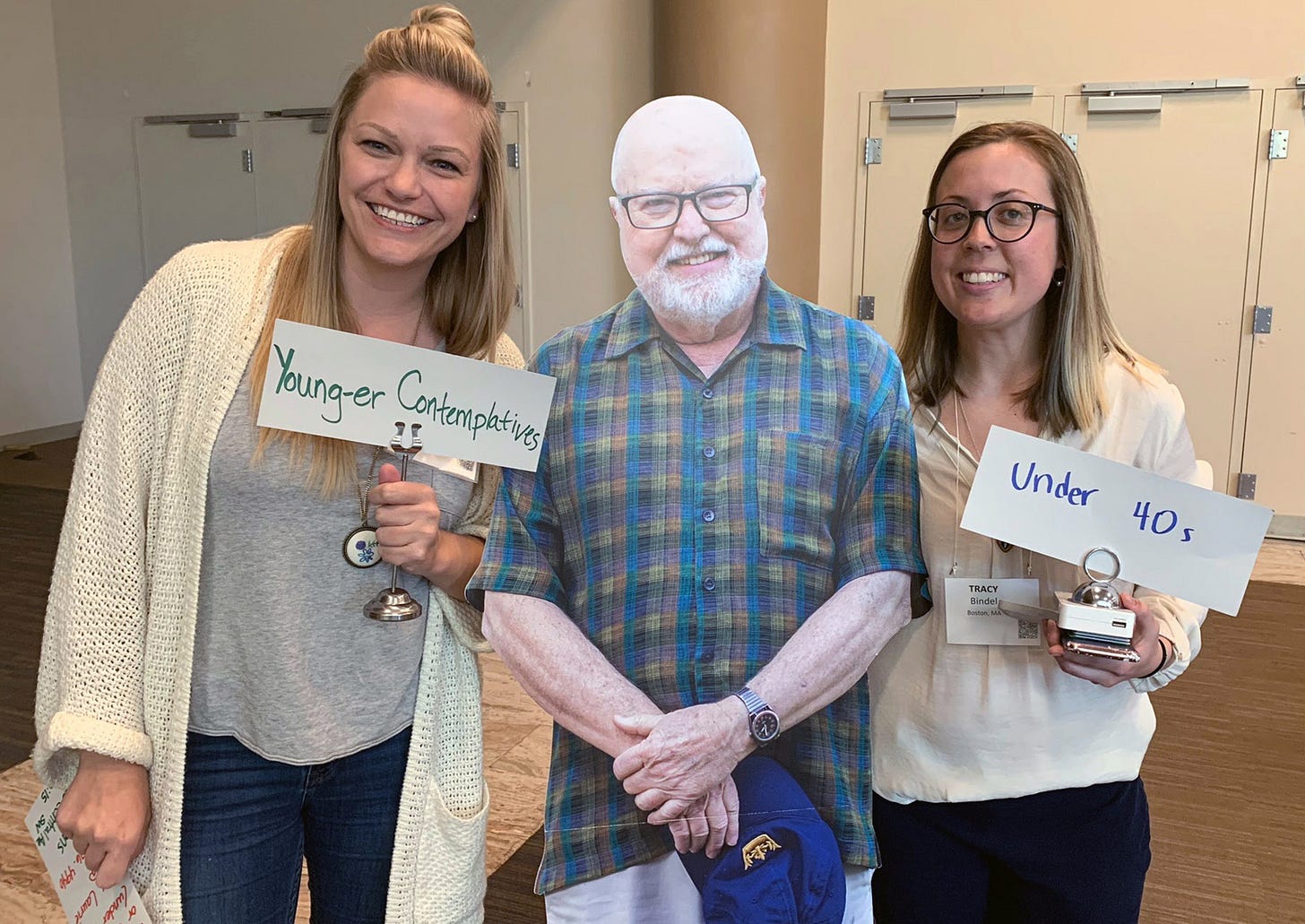Recently, I was sitting in a church service where the pastor quoted favorably from one of Richard Rohr’s books. Even if you don’t recognize his name, Richard Rohr’s theology of “awakenings” and “self-healing” has impacted countless Christians who’ve gone through a program of addiction or grief recovery. Alisa Childers warns Christians about Rohr’s growing influence in her post.
Rohr’s teachings are gaining influence, especially among millennials who grew up in the Evangelical church. He is particularly influential in the progressive Christian movement and is referred to as a spiritual father, hero, and mentor by well-known progressive voices. He is endorsed by progressive leaders like Rob Bell, Jen Hatmaker, William Paul Young, Michael Gungor, and Brian McLaren, to name just a few. As Rohr gains popularity, it becomes increasingly more important for church leaders to be aware of his teachings and their widespread influence.
Even if we assume that Rohr has good intentions, good intentions aren’t enough. In what follows, I hope to provide sufficient information about Rohr’s contemplative theology to convince you that he is not a good shepherd, but a Blind Fox to be avoided. I hope faithful Christians will heed the warning signs and reject Rohr’s bad theology and misplaced compassion.
Who is Richard Rohr?
Rohr’s bio from the Center for Action and Contemplation gives us a good idea of who he is.
Franciscan friar and ecumenical teacher, Father Richard Rohr bears witness to the deep wisdom of Christian mysticism and traditions of action and contemplation. Founder of the Center for Action and Contemplation, Father Richard teaches how God’s grace guides us to our birthright as beings made of Divine Love. He is the author of numerous books, including The Universal Christ, The Wisdom Pattern, Just This, and Falling Upward.
Rohr’s books on Christian mysticism are popular among Roman Catholics and Evangelicals, but his call to mysticism should be a red flag to any discerning believer. Francis Schaeffer warned us decades ago about the dangers of Christian mysticism among the Neo-orthodox. Mysticism is the belief that our direct experience with a spiritual reality transcends any rational or external verification. For the mystic, experience is truth.
Theologians like Rohr, practice what Schaeffer called "semantic mysticism." These mystics use biblical words—stripped of their historical, rational, and biblical meaning—to create the illusion of alignment with orthodox Christianity while denying any universal meaning to the actual words.
Let’s explore some of Rohr’s mystical theology below.
Rohr’s Theology of Truth
In his 2021 book, Breathing Under Water, Rohr offers the following advice:
As any good therapist will tell you, you cannot heal what you do not acknowledge, and what you do not consciously acknowledge will remain in control of you from within, festering and destroying you and those around you…
Rohr’s advice appears sound, but when you consider his perspective on the ‘conscious’ and ‘unconscious’ as part of his so-called shared cosmic reality, his words take on a wholly unbiblical meaning.
So, according to Rohr, how can we discover our true self?
Rohr’s theology reminds me of the seventeenth-century philosopher Baruch Spinoza, whose naturalistic worldview may be described as pantheism or acosmism. Spinoza advocated for an “all-is-one” physicalism in which nothing exists outside of nature. Spinoza conceived of things such as god, spirits, and humans as nothing more than a localized and finite expression of the eternal nature. For Spinoza, humans (and animals) are defined by their striving (conatus) to exist and increase their awareness about the cosmos.
Like Spinoza, Rohr believes that the “truths” Christians need to discover about life are not found in the Bible or in the Church, but in our relationship with the physical world. Rohr writes,
“The longer I live the more I believe that truth is not an abstraction or an idea that can be put into formulas or mere words. Our real truth has to do with how we situate ourselves in this world… There are ways of living and relating that are honest and sustainable and fair, and there are utterly dishonest ways of living and relating to life. This is our real, de facto, and operative ‘truth,’ no matter whose theories or theologies we believe. Our life situation and our style of relating to others is ‘the truth’ that we actually take with us to the grave. It is who we are, more than our theories about this or that… [emphasis mine]”
For Rohr, your beliefs about God grounded in religious tradition, creeds, or even in the Bible itself don’t matter. The only reliable source of truth lies within each person—our experiences and awareness of the universal consciousness.
Richard Rohr’s theology of truth is a denial of the Bible as truth.
To be clear, I believe that every person is created by God with an internal witness to the truth (Romans 2:14-15) and nature is a witness to truth (Psalm 19:1). But, the foundation for truth is found in the person of God (John 14:6), revealed to us in Scripture (2 Timothy 3:16-17), and confirmed in us by the Holy Spirit (John 16:13). This view of truth is far different than what Rohr view of truth. You can see, for example, Rohr’s semantic mysticism played out in his theology of the atonement.
Rohr’s Theology of the Atonement
Armed with his contemplative way of knowing, Rohr redefines not only the person of Jesus, but the traditional doctrine of the atonement. Rohr “liberates” us from these old doctrines when he writes,
The commonly accepted atonement theory led to some serious misunderstandings of Jesus’ role and Christ’s eternal purpose, reaffirmed our narrow notion of retributive justice, and legitimated a notion of ‘good and necessary violence.’ It implied that God the Father was petty, offended in the way that humans are, and unfree to love and forgive of God’s own volition. This is a very untrustworthy image of God which undercuts everything else.
So Rohr believes that Jesus’ death on the cross did not atone for sin and those who teach this doctrine malign God’s character.
So if we can’t find atonement in the crucifixion of Jesus, can we find atonement in the teachings of Jesus? For Richard Rohr, the answer is still a resounding no.
Rohr holds that all language is metaphorical, therefore, the truth about our reality (the truth about Jesus) isn’t found in reading the Bible because the words in the Bible don’t really contain the words of Jesus. Rohr assures his readers,
We can only conclude that Jesus’ exact words were apparently not that important for the Holy Spirit—or for us. This should keep us all humble and searching for our own experience of the Risen Christ now instead of arguing over Greek verbs and tenses.
So, if the cross of Jesus does not offer atonement and if the words of Jesus are unimportant, how then do we discover atonement?
For Richard Rohr, Jesus is found only through mystical experience which leads to a new consciousness of the universal Christ found within each person.
Rohr’s Theology of the Universal Christ
As I mentioned above with Spinoza, Rohr’s theology is essentially a form of pantheism (all is god and god is all).
Rohr’s pantheistic worldview is evident in this podcast titled Introducing Another Name for Every Thing with Richard Rohr. This podcast, produced by the Center for Action and Contemplation, features conversations with Richard Rohr about his book, The Universal Christ. Rohr says that his goal for the book was to reframe the gospel which he believes has fallen apart.
…we need to change the game I don't use this in an arrogant way I hope it can be a gamecher for many people to reframe this gospel that appears to be falling apart.
Rohr goes on to define this new gospel of Jesus as a reimagination of material reality.
…another name for everything [is] every and thing separated and I believe that that all thingness physicality materiality is an apparition of the divine and uh our our shortcut word for that I'm not saying it's the only word but our shortcut word for that that no one else has really claimed in such a way is Christ which simply means is the anointing of reality with deeper meaning. So, um yeah, it doesn't it's not a religion to join anymore. In fact, some people join the religion, it seems, never finding the new pair of eyes.
For Rohr, the name of Christ is just the name Christians use to describe our physical reality—the Universal “macro” Christ. In his Weekly Summary about “The Christ” Rohr clarifies his pantheistic worldview.
Christ is a word for the macrocosm, Jesus is the microcosmic moment in time, and all else is the whole cosmos—including you and me. (Sunday)
Whenever the material and the spiritual coincide, there is the Christ. (Monday)
What was personified in the body of Jesus was a manifestation of this one universal truth: Matter is, and has always been, the hiding place for Spirit, forever offering itself to be discovered anew. (Tuesday)
Rohr’s theology is influential because it is taught in conferences designed to advance his theology of the Universal Christ.
The Fruit of Rohr’s Cosmic Christ
The fruit of Rohr’s theology is observed among those who, in pursuit of the Cosmic Christ, have deconstructed their Christian faith and left the “old” Church.

Attending a conference in New Mexico, this writer observed the fruit of Rohr’s mystical theology in one of the attendees.
Anthony Graffagnino describes himself spiritually as both frustrated and curious.
A Pentecostal turned Unitarian, the 28-year-old Graffagnino said he's had his fill with "stale and dead expressions of faith that I saw really doing nothing to better the people around me or the world around me."….
Graffagnino was one of a number of millennials drawn to The Universal Christ — a four-day conference in New Mexico’s capital last month led by Rohr, one of the preeminent Christian contemplatives of the last century. Pentecostal in his early childhood, Unitarian through his teen years and then spiritually unaffiliated until he began “flirting with the Quakers” in his late 20s, Graffagnino also has explored Vedic Hinduism, spiritual Taoism, mystical Judaism and Sufism. Rohr’s work has been a bridge between those spiritual traditions and his native Christianity, where they have “found a resting place in my own backyard,” he said”
Getting people out of the traditional church with “old” theology is Rohr’s goal.
On his podcast, Another Name for Everything, Rohr explores his alternative orthodoxy of the Cosmic Christ which he hopes he will replace the old “failing Gospel” taught in the Church. During the show, Rohr is asked this question:
In your book you talk about Christ being materiality itself beginning with the Big Bang. This begs the question: What is the difference in the universe and Christ? Are they synonyms? If so, is the universe the second person of the Trinity?
Rohr responded,
I think John got the point that the universe is the body of God, and as I love to say, what else could it be? Did it come from some other source? It’s the external reflection of the internal mystery and glory and beauty of God, and even taking it to “Yes,” it’s the second person of the Trinity in visible form.
For Rohr, the universe itself is the second person of the trinity. The material world is the Cosmic Christ and all humans—because we are material—are a part of the Cosmic Christ. That means to become self-aware is to become aware that we, like Jesus, are the Christ.
For Richard Rohr, atonement is coming to grips with the reality that we are the second person of the trinity. We are Christ in flesh.
The fruit of Rohr’s teaching is not just a deconstruction of faith, but the fruit is evident in his misplaced compassion.
Rohr’s Sexual & Gender Theology
As a father and professor teaching mostly college freshman, I’m always interested to know how theology impacts our morality. For Rohr, because truth is found within our own Christ consciousness, morality is not an external truth. Ethics, therefore, cannot be a proposition found in Scripture. Morality is found in our mystical encounter with the Cosmic Christ within.
For Richard Rohr, the pursuit of mystical experiences with the Cosmic Christ is what leads to moral enlightenment.
When it comes to gender and sexual ethics, Rohr’s view is clear.
With all the changing ways of understanding gender and sexuality, most of us truly need contemplative eyes and the guidance of the Holy Spirit to “rupture simplistic binaries” and be compassionate and respectful of difference and diversity. It clearly seems that God is quite comfortable with immense diversity.
The binary of male and female, says Rohr, is simply one more hurdle to be overcome in our process of uniting with the Cosmic Christ.
What Next?
Have Rohr’s ideas helped some people overcome addiction or grief? I’m sure his words have made a short term impact for the better, but when it comes to the enteral Word of Jesus and the spoken Word of Scripture, Rohr is not helping he’s hurting.
Richard Roher’s Cosmic Christ is an anti-Christ. Trust in Rohr’s theology leads to misplaced compassion.
Knowing what Richard Rohr teaches is one thing, the real question is what’s next for pastors and church leaders who have integrated his books and ideas into their small groups.
I’ll leave you to consider the words of Jesus because, despite what Rohr teaches, the Bible records for us the words of truth and salvation. It is not enough to free people from addiction or pain or suffering… we must free people for eternity.
John 6:22–59
On the next day the crowd that remained on the other side of the sea saw that there had been only one boat there, and that Jesus had not entered the boat with his disciples, but that his disciples had gone away alone. 23 Other boats from Tiberias came near the place where they had eaten the bread after the Lord had given thanks. 24 So when the crowd saw that Jesus was not there, nor his disciples, they themselves got into the boats and went to Capernaum, seeking Jesus. 25 When they found him on the other side of the sea, they said to him, “Rabbi, when did you come here?” 26 Jesus answered them, “Truly, truly, I say to you, you are seeking me, not because you saw signs, but because you ate your fill of the loaves. 27 Do not work for the food that perishes, but for the food that endures to eternal life, which the Son of Man will give to you. For on him God the Father has set his seal.” 28 Then they said to him, “What must we do, to be doing the works of God?” 29 Jesus answered them, “This is the work of God, that you believe in him whom he has sent.” 30 So they said to him, “Then what sign do you do, that we may see and believe you? What work do you perform? 31 Our fathers ate the manna in the wilderness; as it is written, ‘He gave them bread from heaven to eat.’ ” 32 Jesus then said to them, “Truly, truly, I say to you, it was not Moses who gave you the bread from heaven, but my Father gives you the true bread from heaven. 33 For the bread of God is he who comes down from heaven and gives life to the world.”
34 They said to him, “Sir, give us this bread always.” 35 Jesus said to them, “I am the bread of life; whoever comes to me shall not hunger, and whoever believes in me shall never thirst. 36 But I said to you that you have seen me and yet do not believe. 37 All that the Father gives me will come to me, and whoever comes to me I will never cast out. 38 For I have come down from heaven, not to do my own will but the will of him who sent me. 39 And this is the will of him who sent me, that I should lose nothing of all that he has given me, but raise it up on the last day. 40 For this is the will of my Father, that everyone who looks on the Son and believes in him should have eternal life, and I will raise him up on the last day.”
41 So the Jews grumbled about him, because he said, “I am the bread that came down from heaven.” 42 They said, “Is not this Jesus, the son of Joseph, whose father and mother we know? How does he now say, ‘I have come down from heaven’?” 43 Jesus answered them, “Do not grumble among yourselves. 44 No one can come to me unless the Father who sent me draws him. And I will raise him up on the last day. 45 It is written in the Prophets, ‘And they will all be taught by God.’ Everyone who has heard and learned from the Father comes to me— 46 not that anyone has seen the Father except he who is from God; he has seen the Father. 47 Truly, truly, I say to you, whoever believes has eternal life. 48 I am the bread of life.49 Your fathers ate the manna in the wilderness, and they died. 50 This is the bread that comes down from heaven, so that one may eat of it and not die. 51 I am the living bread that came down from heaven. If anyone eats of this bread, he will live forever. And the bread that I will give for the life of the world is my flesh.”
52 The Jews then disputed among themselves, saying, “How can this man give us his flesh to eat?” 53 So Jesus said to them, “Truly, truly, I say to you, unless you eat the flesh of the Son of Man and drink his blood, you have no life in you. 54 Whoever feeds on my flesh and drinks my blood has eternal life, and I will raise him up on the last day. 55 For my flesh is true food, and my blood is true drink. 56 Whoever feeds on my flesh and drinks my blood abides in me, and I in him. 57 As the living Father sent me, and I live because of the Father, so whoever feeds on me, he also will live because of me. 58 This is the bread that came down from heaven, not like the bread the fathers ate, and died. Whoever feeds on this bread will live forever.” 59 Jesus said these things in the synagogue, as he taught at Capernaum.
For better or worse, everyone's a theologian, what kind are you?
From 1971 to 1983, Archie Bunker, played by Carroll O’Connor, became America’s most infamous icon of bigotry. Norman Lear, the producer of All in the Family, used Archie to create a caricature of what he perceived to be the typical white Christian Republican. The opening song to All in the Family lamented Archie’s desire for the “good old days” when men…










